

Naomi
TeachingEnglish - British Council - A live Question and Answer session on assessing our learners. Assessing learners online: assessment criteria. Using screencast-o-matic to provide feedback on writing. Practical Ideas for Classroom Formative Assessment. We are all better at spotting mistakes in the work of others.
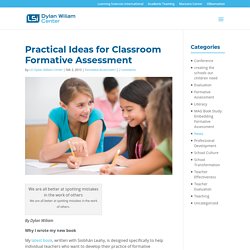
By Dylan Wiliam Why I wrote my new book. IATEFL: global get-together Final Panel. Teaching online - using your coursebook and ideas for breakout rooms. About the webinar The British Council is committed to supporting the use of technology for the continuation of education in a crisis.
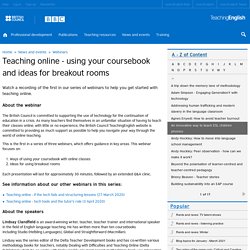
As many teachers find themselves in an unfamiliar situation of having to teach their classes online, with little or no experience, the British Council TeachingEnglish website is committed to providing as much support as possible to help you navigate your way through the world of online teaching. This is the first in a series of three webinars, which offers guidance in key areas. This webinar focuses on: TeachingEnglish. 10 tools for effective peer feedback in the classroom - Ditch That Textbook. Providing feedback is an important skill. The ability to give meaningful feedback to our peers is even more powerful.
Here are 10 tools for effective peer feedback in the classroom. As teachers, we strive to provide our students with quality feedback on their work. Getting feedback from their teacher is useful but getting feedback from their peers can be even more powerful. 7 Tips For Peer And Self-Assessment. Christina Brown Christina is an Art and Design Teacher in a London secondary school.

In her third year of teaching, she has also just completed an MA in Art and Design in Education at The Institute of Education (University College London). Christina is also a practicing artist... Creative activities for Language Learners at home. Introduction The British Council is committed to supporting the use of technology for the continuation of education in a crisis.
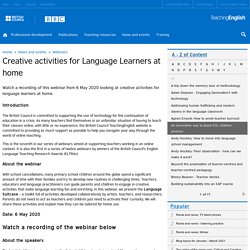
As many teachers find themselves in an unfamiliar situation of having to teach their classes online, with little or no experience, the British Council TeachingEnglish website is committed to providing as much support as possible to help you navigate your way through the world of online teaching. This is the seventh in our series of webinars aimed at supporting teachers working in an online context. It is also the first in a series of twelve webinars by winners of the British Council's English Language Teaching Research Awards (ELTRAs) About the webinar. Parents and young learners in English language teaching: global practices and issues in school–home contacts. Assessment for Learning. So, what is AfL and why is it important?
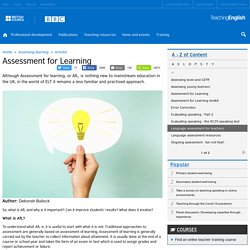
Assessment for Learning. What is Assessment for Learning?
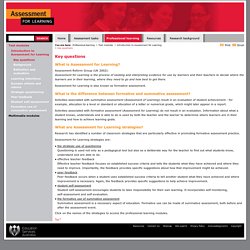
Assessment Reform Group (UK 2002):Assessment for Learning is the process of seeking and interpreting evidence for use by learners and their teachers to decide where the learners are in their learning, where they need to go and how best to get there. Assessment for Learning is also known as formative assessment. What is the difference between formative and summative assessment? Activities associated with summative assessment (Assessment of Learning) result in an evaluation of student achievement - for example, allocation to a level or standard or allocation of a letter or numerical grade, which might later appear in a report.
Unsupported Browser. Motivating speaking activities. At this age, the learners aren't motivated by new language, they're motivated by an activity.
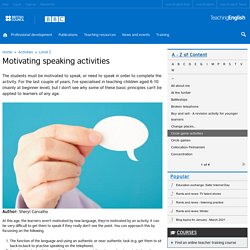
It can be very difficult to get them to speak if they really don't see the point. You can approach this by focussing on the following. The function of the language and using an authentic or near authentic task (e.g. get them to sit back-to-back to practise speaking on the telephone).A motivating task, which uses the language you want them to practise (e.g. students write questions on small squares of paper using the target language, then form the papers into a board game to be played using dice and counters). Here are some possible examples, which apply to one or a combination of the above. A popular, well-known type of activity is the information gap.
Making an arrangement: Each group has a diary, with appointments already filled in. Motivating pupils to read. This article describes ways to generate initial motivation, the second one shows how to maintain this motivation.
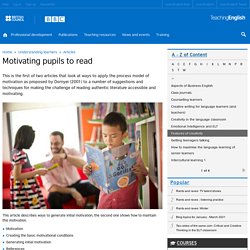
Motivation Creating the basic motivational conditions Generating initial motivation References Motivation Motivation is one of the key factors that determine the rate and success of L2 attainment. It provides the main incentive to initiate learning a foreign language and later the determination to persevere and sustain the long and often difficult learning process. Without sufficient motivation, even individuals with the best of abilities cannot accomplish long-term goals. Teachers working in state schools are first and foremost supposed to teach the curriculum, but we cannot ignore the fact that this cannot happen without motivating our learners. Creating the basic motivational conditions. Rachael Roberts - Planning for differentiation.
About the webinar The session will start by looking at some of the ways in which learners can differ from each other - needs, interests and abilities.
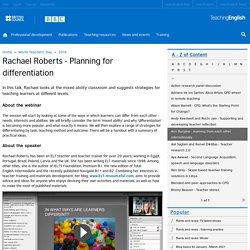
We will briefly consider the term 'mixed ability' and why 'differentiation' is becoming more popular, and what exactly it means. Differentiated Instruction: How to Make Lessons Accessible for All. A Video Series When some teachers think of differentiating instruction, they imagine having to create a different lesson for every student in the room.
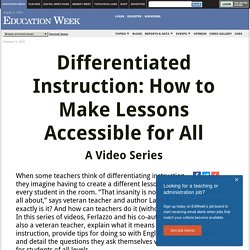
Deb Roy: The birth of a word. Netflix and learn – six ways to teach English language skills with television. How can teachers of English create learning material with streaming services? Melissa Thomson, a British Council teacher and trainer based in Bilbao, describes her top six approaches.
Last year I asked my teenage learners to list the five places they were most likely to encounter English online, and the top answer was Netflix. Over 37 per cent of the world's internet users subscribe to Netflix, a streaming service for movies and television series. Can we learn a second language like we learned our first? Robert William McCaul, winner (with Marek Kiczkowiak) of the TeachingEnglish blog award, examines the influential ideas of linguist Stephen Krashen, and the implications they have for the language classroom.
If you've ever doubted whether you're a good language learner, then bear in mind that you've already learned one language very well indeed – your first. But this raises an interesting question: can adults learn a second language in the same way they learned their first as children? And if so, what are the implications for the classroom? Webinar with Dr Stephen Krashen. SpeakPipe - receive voice messages from your audience directly on your website.
Moodle. Virtual Ice Breakers - Communication Skills From Mind Tools. © iStockphotopniesen Break down the communication barriers caused by remote working. Virtual ice breakers are a great way of overcoming one of the biggest challenges of managing a remote team – that is the lack of opportunities for team bonding. It's no longer as simple as walking over to someone's desk for a quick catch up or having an informal chat round the "water cooler. " Building rapport, developing lines of communication and simply getting to know your team mates takes effort when you all work from home.
But this can have serious implications. Virtual ice breakers can help you to bring your team together and break down the communication barriers caused by remote working. What Is a Virtual Ice Breaker? The First Class. Even experienced teachers often feel nervous on day one with a new group and many claim that the adrenaline actually helps the class go well. So, don’t panic if you feel a few butterflies in your stomach. There are several things you can do to help make the first day less daunting and ensure that the class goes smoothly. Firstly, be clear of your objectives. Art For Kids Hub - Art Lessons - How To Draw For Kids. Guess what the photos are. YouTube. The Principles.
Montessori Australia. Montessori is an approach to supporting the full development of the human being. The Montessori approach offers a broad vision of education as an ‘aid to life’. As an educational system, it is used in over 22,000 schools worldwide, and has a longer track record of success than any other educational approach in the world. The Montessori approach to education, inspires children towards a lifelong love of learning, by following their natural developmental trajectory. Children become confident, responsible, independent learners, who trust in their own abilities. Every Child - Playing with phonics - Teaching letters and sounds (APAFT) - Informit.
SAGE Publications Australia. Moodle. New phonics test will do nothing to improve Australian children's literacy. Minister Birmingham released a report today recommending that all Year 1 students in Australia complete a phonics test. The panel responsible for the report has recommended that Australia adopt the Year 1 phonics screening check that has been used in England since 2011. Seven things to consider before you buy into phonics programs. Phonics, or teaching reading, writing and spelling through sounds, is often touted as the golden path to reading and writing.
Australian Journal of Language and Literacy, The - Feeling the pressure: Early childhood educators' reported views about learning and teaching phonics in Australian prior-to-school settings (Humanities & Social Sciences Collection) - Informit. Low-cost play ideas & materials. 5 ways to win over parents to the importance of play in international EYFS.
Building on what children know (free article) - Early Childhood Australia. ‘Take the child on from where they are now’ has long been a slogan in early childhood, but I wonder, as educators, if we always do it? Assessment for learning. Observation, Assessment and Planning - Early Years Matters. The EYFS Profile summarises and describes children’s attainment at the end of the EYFS. Pre-birth to Three: Observation, Assessment and Planning. 2Bbellybreathhome. This ‘Kindness Curriculum’ Is Free And Should Be Used In Every Classroom. Imagine living in a world that valued kindness enough to teach it along with academics. 21 of the Best Early Years Books for International Friendship Day.
We know that skills like empathy aren’t fully developed until later in a child’s life, which is why there are so many stories on friendship and how to treat people aimed at Early Years. The Key to Effective Classroom Management. A 19-Year Study Reveals Kindergarten Students With These 2 Skills Are Twice as Likely to Obtain a College Degree (and They Have Nothing to Do With Reading)
One theory all teachers with disruptive children should know about. Don't Expect Toddlers To Behave Consistently — They Literally Can't. Can Free Play Prevent Depression and Anxiety In Kids? KQED Public Media for Northern CA. KQED Public Media for Northern CA. Positive Learning Environment - Primary. Key Person & Attachment - Early Years Matters. How Are Happiness and Learning Connected? Guiding Principles for Use of Technology with Early Learners.
Whole Child Development Is Undervalued. Poems for kids. Nursery Rhymes and Songs - BBC Teach. Music and Movement Activities for Toddlers and Preschoolers. 50+ Quick & Easy Kids Crafts that ANYONE Can Make! Short stories for kids. The Art of Control. How to help your child learn English with YouTube videos. Practical tips.
Sound Words: Examples of Onomatopoeia. Serve and Return. Effective Teacher-Child Interactions. Quality Interactions Early Years. The Brain-Changing Power of Conversation. MIT Brain Study: Back-And-Forth Talk Key To Developing Kids' Verbal Skills. Carol Dweck: The power of believing that you can improve. How can parents and teachers best educate young children? Listening Skills for Staff. A longitudinal investigation of the role of quantity and quality of child-directed speech in vocabulary development.
What is play based learning. 5 ways to win over parents to the importance of play in international EYFS. Deconstructing Role Play – Provide the Resources, Step Back and Watch Children’s Learning Flourish. Symbolic play and language development. NPR Choice page. The cognitive benefits of play: Effects on the learning brain. Low-cost play ideas: video. Why Movement is Essential in Early Childhood.
Play to Learn: Discussion. Play to Learn. David whitebread importance of play report. Importance of play for babies & children. How young children learn English through play. ZERO TO THREE. Different types play. 6 Types of Play: How Children's Play Becomes More Social.
Getting the right balance between adult-led and child-initiated learning. Community Playthings. How do you speak 'Motherese'? The Power of Evening Routines.
The Woman Who Changed Her Brain: Barbara Arrowsmith-Young at TEDxToronto. How baby brains develop. FAQ: Raising Bilingual Children. Deb Roy: The birth of a word.